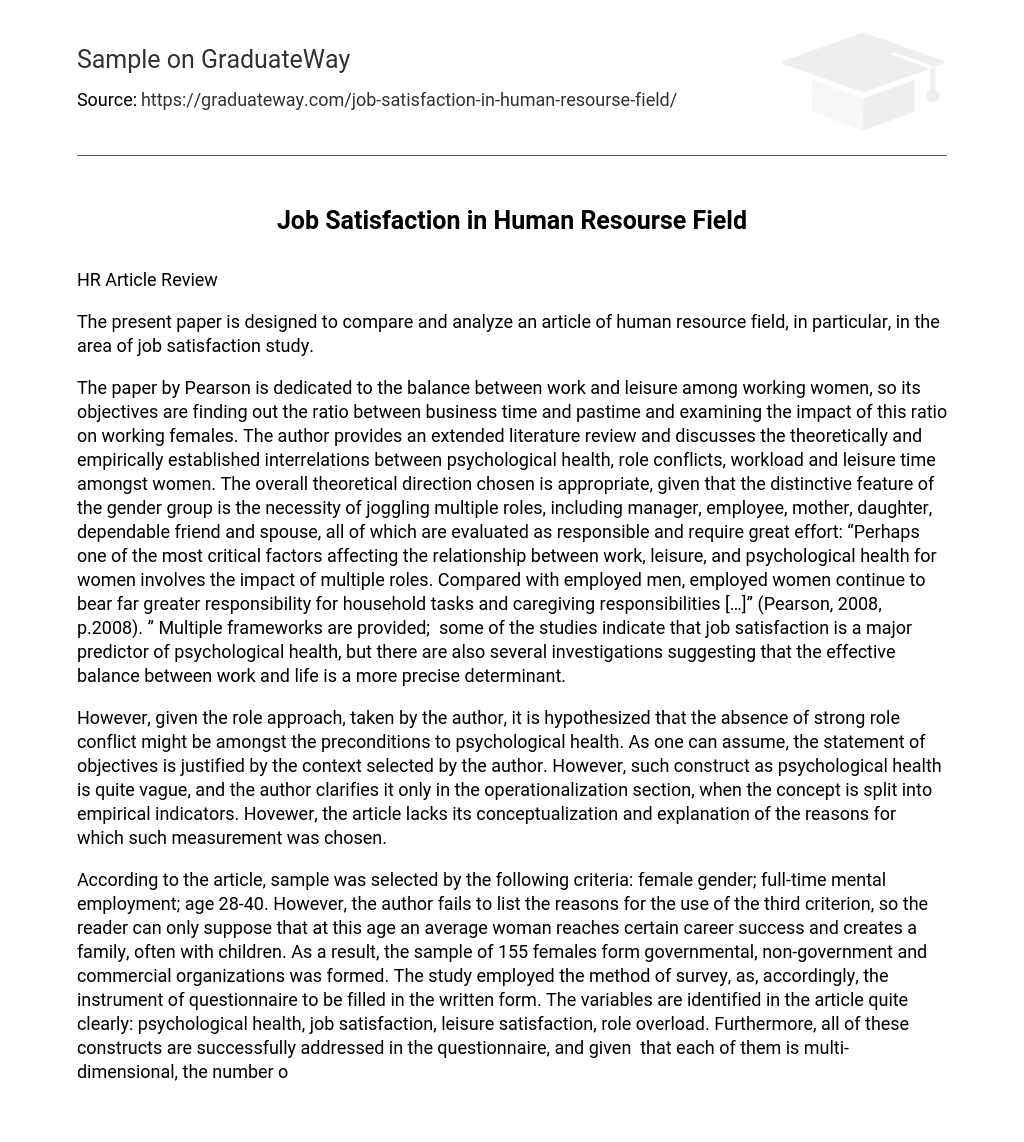HR Article Review
The present paper is designed to compare and analyze an article of human resource field, in particular, in the area of job satisfaction study.
The paper by Pearson is dedicated to the balance between work and leisure among working women, so its objectives are finding out the ratio between business time and pastime and examining the impact of this ratio on working females. The author provides an extended literature review and discusses the theoretically and empirically established interrelations between psychological health, role conflicts, workload and leisure time amongst women. The overall theoretical direction chosen is appropriate, given that the distinctive feature of the gender group is the necessity of joggling multiple roles, including manager, employee, mother, daughter, dependable friend and spouse, all of which are evaluated as responsible and require great effort: “Perhaps one of the most critical factors affecting the relationship between work, leisure, and psychological health for women involves the impact of multiple roles. Compared with employed men, employed women continue to bear far greater responsibility for household tasks and caregiving responsibilities […]” (Pearson, 2008, p.2008). ” Multiple frameworks are provided; some of the studies indicate that job satisfaction is a major predictor of psychological health, but there are also several investigations suggesting that the effective balance between work and life is a more precise determinant.
However, given the role approach, taken by the author, it is hypothesized that the absence of strong role conflict might be amongst the preconditions to psychological health. As one can assume, the statement of objectives is justified by the context selected by the author. However, such construct as psychological health is quite vague, and the author clarifies it only in the operationalization section, when the concept is split into empirical indicators. Hovewer, the article lacks its conceptualization and explanation of the reasons for which such measurement was chosen.
According to the article, sample was selected by the following criteria: female gender; full-time mental employment; age 28-40. However, the author fails to list the reasons for the use of the third criterion, so the reader can only suppose that at this age an average woman reaches certain career success and creates a family, often with children. As a result, the sample of 155 females form governmental, non-government and commercial organizations was formed. The study employed the method of survey, as, accordingly, the instrument of questionnaire to be filled in the written form. The variables are identified in the article quite clearly: psychological health, job satisfaction, leisure satisfaction, role overload. Furthermore, all of these constructs are successfully addressed in the questionnaire, and given that each of them is multi-dimensional, the number of questions reaches 75. Data was analyzed using stepwise regression framework, which can be assessed as helpful with respect to the overall design, since it allowed defining the factor that balanced, increased or decreased psychological health in combination with another one.
The results suggest that role overload add negatively to psychological health, whereas the evidence of both job and leisure satisfaction “smoothen” this problem and define self-actualizing personality. However, the gratification either with job or pastime alone fails does not raise psychological health substantially, these two factors are more influential in pair. The conclusions refer to the HR realm and point to the necessity of internal regulations protecting employee’s maternal right (childcare and family care leaves) and the importance of making the procedure of getting permission for such justified absence easier and quicker.
As one can conclude, the study design is generally appropriate and fits the theoretical context, goal and objectives, but the article lacks important definitions and explanations, which make it less understandable to HR executives with lower academic background.
Reference list
Pearson, Q. (2008). Role Overload, Job Satisfaction, Leisure Satisfaction, and Psychological Health Among Employed Women. Journal of Counseling & Development, 86 (1): 57-63.





